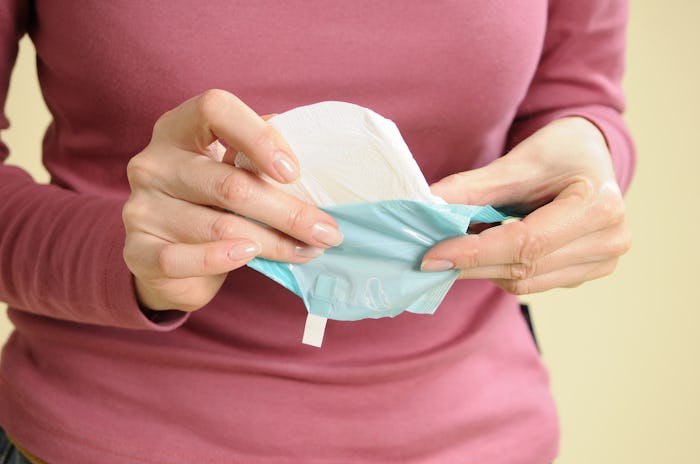Life

Leaking Pee Is Common, But Here's The Red Flag That Should Make You Call Your Doctor
Chances are, if you've been pregnant, you know what it's like to pee a little when you sneeze, cough too hard, or even laugh. It's a pretty common thing, and nothing to be ashamed of — but urinary incontinence can be quite concerning to the person experiencing it, causing a lot of discomfort and embarrassment, even if it's just a few drops. While we know this happens a lot, when is leaking urine serious? What red flags should you look for?
Leaking pee, otherwise known as "urinary incontinence," is a fairly common condition affecting between 3 and 11 percent of all women at some point in their lives, according to Reviews in Urology. It should be noted that there are a few primary types of incontinence, noted Thomas Jefferson University Hospital in Philadelphia, Pennsylvania. The hospital reported that "most cases of urinary incontinence in women fall under one of three major subtypes: urge, stress, or mixed." Urge incontinence is the overwhelming feeling that you just have to go, and you don't quite make it in time. Stress incontinence is the pee that leaks when you sneeze, workout, or laugh too hard. Mixed is a combination of stress and urge. The report by Thomas Jefferson states that urinary incontinence should always, always, be evaluated, even if you think it's no big deal.
When I was pregnant with my daughter, I had this problem. I was told that because my son literally ripped me a new one with a near fourth degree tear that my pelvic floor was still a bit weak, and my urethra wasn't holding court so well. I was really bothered by it. I don't know if it was the unpredictability of the problem, or the fact that my OB-GYN didn't have a lot of good solutions for me, but it caused me a lot of frustration. And here's the thing, when I had my son, they told me that because of the way I tore, this was a real possibility in the future. Even with the warning it was stressful. Not to mention messy, annoying, and just a downright pain in the butt.
I don't want anyone else to feel this way, and after talking to a lot of my mom friends about this, I know that I am far from the only woman to experience this. And it doesn't only happen when you're pregnant — urinary incontinence affects women in all stages of their life. That's why I contacted Donald J. DeBrakeleer, DO, an Obstetrician/Gynecologist with expertise in urogynecology from Einstein Medical Center Montgomery and asked him to share the red flags that mean your leaking pee is more serious than you think.
DeBrakeleer tells Romper, "Urinary incontinence (leaking pee) is never a normal thing. It can happen commonly, but that does not make it normal." I think this is a common misconception in women's health. We're so conditioned to just "put up with it," that we brush the abnormal off as normal and go on about our day, putting our health at risk because that's just what we've been taught to do. DeBrakeleer notes that with pregnancy, your pelvic floor can become weakened, leading to urinary incontinence, and while it happens to many women, he says, "When you are having that kind of problem, you should talk to your doctor." Meaning, the only red flag regarding your urinary incontinence that you need to visit your doctor is urinary incontinence alone — it always demands a visit to your provider.
And it's not just women who've been pregnant or who are pregnant. DeBrakeleer offers that another type of bladder leakage is "from unwanted bladder contractions. These bladder contractions can happen for a variety of reasons. Bladder irritation, an overly sensitive bladder, or a number of neurological problems can all lead to these unwanted bladder contractions. One of the most common symptoms of multiple sclerosis is having these unwanted bladder contractions. Another common problem in young women, endometriosis, can cause the bladder to be overly sensitive."
I know it seems like a pain in the vagina to hit up the doctor for what might just be a few drops of pee now and again, but it's important to your health. Thankfully DeBrakeleer says that "even if it is not because of a serious issue, it is not normal and can usually be very easily fixed either with exercises or minor surgery." Might as well find out your options, right?